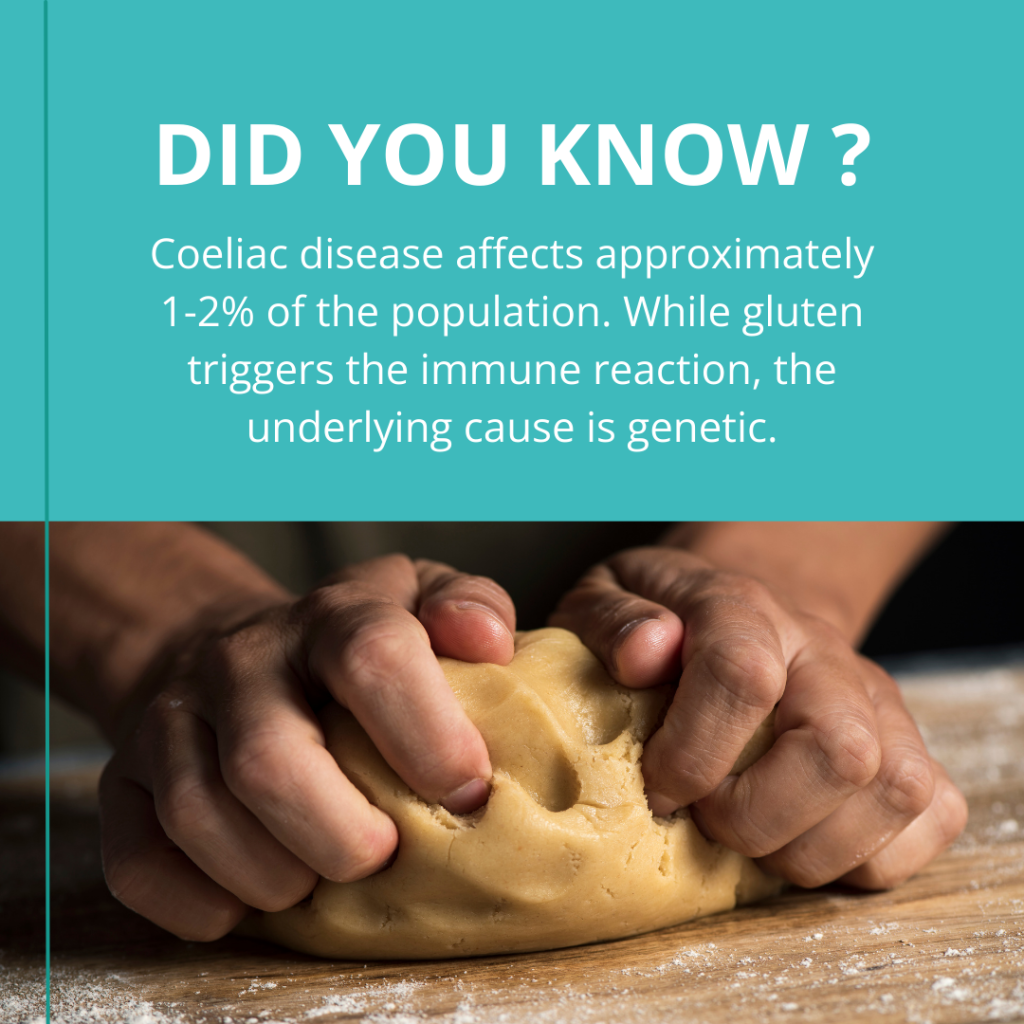Have you head of “gluten intolerance,” “gluten sensitivity,” or “coeliac disease”? Popularised in the media, awareness about these conditions has led to a trend of gluten-free diet. Yet, despite being used interchangeably, these conditions differ significantly in their presentation and severity. What they have in common, however, is gluten.
Gluten is a structural protein found in many cereal grains, including wheat, barley, rye, and some oats species. It helps give the dough its elasticity and rise. If you love the chewy texture of fresh bread, you can thank gluten. In fact, 75-85% of the total protein in bread wheat is gluten.
Unfortunately, gluten triggers an inflammatory, immunological, or autoimmune response in some individuals. Chief among these disorders is coeliac disease. Learn more about this condition, its symptoms, and how to determine if you have it below.
What is Coeliac Disease?
Coeliac disease is an autoimmune condition where the body’s immune system attacks the lining of the small intestine in response to the presence of gluten.
Coeliac disease should not be confused with a food allergy, intolerance, or sensitivity. No allergic reaction occurs, and the body can still technically digest gluten. Rather, white blood cells and antibodies detect gluten and label it as a foreign object. That leads to inflammation and an immune reaction.
In the small intestine’s lining, tiny structures called villi, through which we absorb nutrients, are damaged, becoming flattened from prolonged inflammation. Over time, this reduces their ability to absorb nutrients, affecting other body parts, including the bones, teeth, brain, and nervous system.
What Causes Coeliac Disease?
Coeliac disease affects approximately 1-2% of the population. While gluten triggers the immune reaction, the underlying cause is genetic. Ninety-five per cent of coeliac patients have a variant of the HLA-DQ2 or HLA-DQ8 allele. These genes modulate how your body reacts to foreign substances. In coeliac patients, they predispose individuals to an immune reaction in response to gluten. Once this response occurs, gluten sensitivity is permanent, and the disease becomes lifelong.

Risk Factors
Being partially genetic, coeliac disease often runs in families. If you have a close family member (brother, sister, parent, or child) with this condition, there is a 10% chance you will develop the condition.
Coeliac disease is also associated with other autoimmune conditions, such as:
- Rheumatoid arthritis
- Type 1 diabetes
- Certain thyroid disease
Coeliac Disease Symptoms
Symptoms depend on when the condition first presents. Delayed development, nutritional deficiencies, diarrhoea, vomiting, and a swollen tummy are classic signs in babies and children.
In adults, however, the symptoms are often related to poor absorption of vitamins, iron, and other nutrients:
- Iron deficiency anaemia
- Diarrhoea
- Lethargy and tiredness
- Abdominal pain
- Severe or persistent mouth ulcers
- Unintentional weight loss
- Headaches
- Achy joints
- Low bone mass
Diagnosing Coeliac Disease
You must present with one or more coeliac disease symptoms to diagnose the condition, often alongside a nutritional deficiency. A simple blood test can detect iron, vitamin B12, folate, and other nutritional deficiencies.
If a doctor suspects the condition, an antibody test will be carried out while the individual continues to eat gluten, to test for:
- Tissue transglutaminase antibody (tTg)
- Endomysial antibody (EMA)
These tests are helpful but not conclusive, especially in the condition’s early stages. For a final diagnosis, a small intestine biopsy is required via endoscopy/gastroscopy. During this procedure, an endoscope is passed through the mouth and stomach into the small intestine.
The biopsy is then examined microscopically to identify villous atrophy – the breakdown of the villi (confirmation of coeliac disease).
If these results are negative, but you still have problems digesting gluten, you may have non-coeliac gluten sensitivity. Our Individual Ultimate Test checks 975 sensitivities to common ingredients, including gluten. It will provide a complete breakdown of your sensitivity level for each substance, allowing you to improve your gut health.
Treating Coeliac Disease
The primary treatment is a lifelong gluten-free diet. That means eliminating all sources of gluten, including bread, pasta, cakes, pastries, and some cereals. Avoiding gluten completely will allow individuals to live a normal life. However, even small amounts of gluten can elicit symptoms, triggering further damage to the small intestine’s villi.
If left untreated or inadequately treated, nutritional deficiencies can lead to:
- Osteoporosis or thinning of the bones
- Weak teeth enamel
- Gut cancer
- Having a low-birth-weight baby or premature delivery if you become pregnant.
Always consult a medical professional or dietary expert for advice on treating coeliac disease.
Are you tired of wondering if gluten is the culprit behind your digestive discomfort? Take the first step towards understanding your body better with our Individual Ultimate Test. Uncover your sensitivities, including gluten, and embark on a journey to personalised nutrition for a healthier life.


